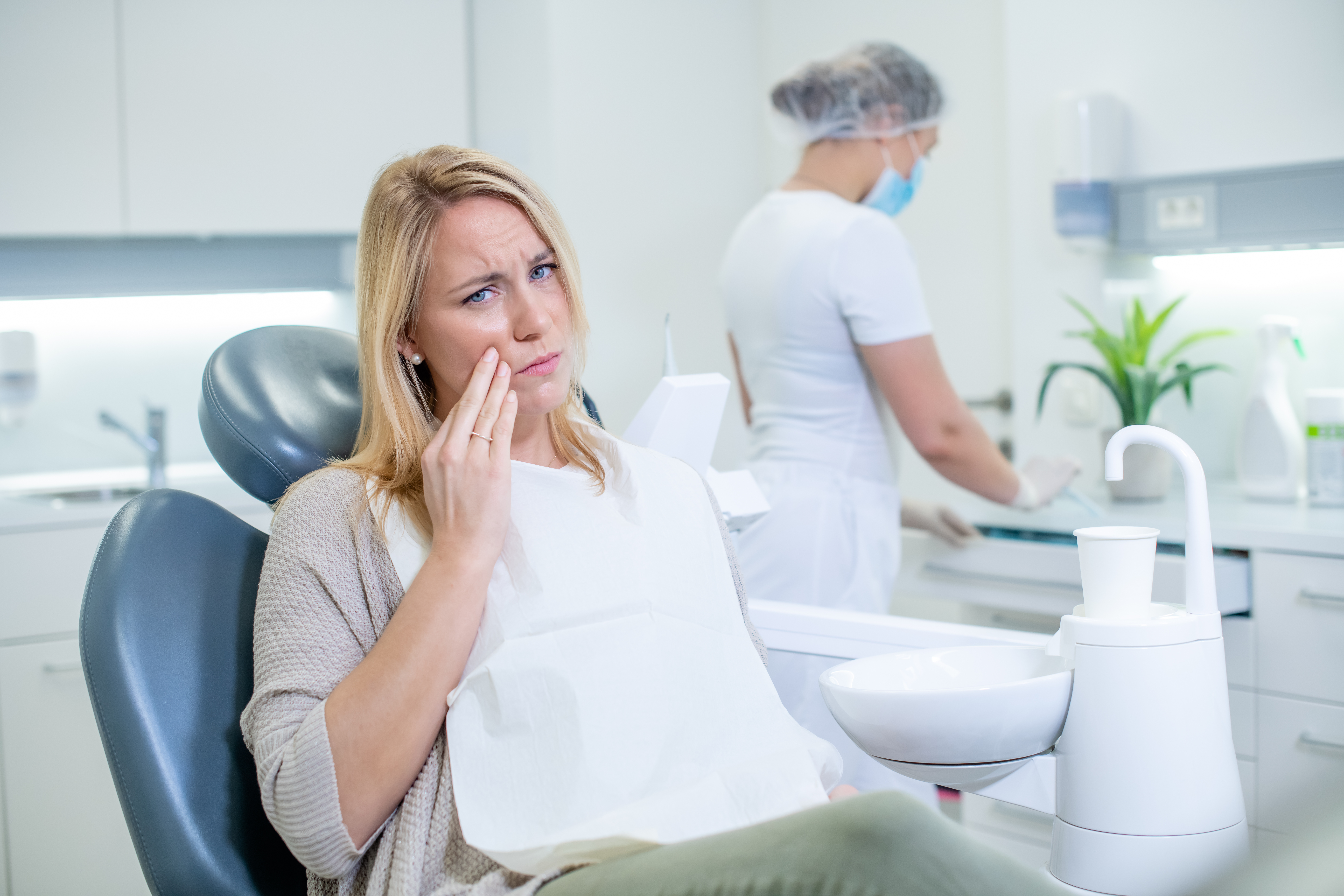
Reality bites: The true cost of dental care
Seeing the dentist for the first time in a while? Need to take your child to the dentist? There are things you should know before you go.
The rising cost of living has taken a big bite out of our budgets, and dental care is often one of the first areas to be overlooked. In fact, a staggering 58 percent of Australians have put off dental treatment in the last 12 months due to cost concerns.
However, delaying and avoiding dental care can have serious ramifications for your health. By postponing regular check-ups and recommended treatments, you might face more complex dental issues, which inevitably mean paying a lot more to address.
While the cost of dental services is a real concern, it doesn't have to lead to neglecting oral health. With a little legwork, it's possible to make dental care more affordable.
The differences between public and private dental care
In Australia, your dental health services are more likely to come from private dental clinics, as they provide more than 85 percent of dental care. These private clinics might be owned by large corporations, private health insurance companies, or individual dentists.

The primary advantage of private dental clinics is there’s generally little waiting time. You can often receive treatment promptly. However, the cost of treatment can vary widely as there's no standard for the fees. A comprehensive dental exam, for example, may set you back anywhere from $50–$92, filling an anterior tooth from $121–$233 and a scale and clean from $93–$171, according to the Australian Dental Association survey.
Most dental care isn't covered by Medicare, so you'll need to pay for your treatment at a private clinic. If you have private health insurance with extras, it might cover a portion of the cost, but there's often a gap fee you'll still need to pay.
With public dental services, on the other hand, you can get general or emergency dental treatments at a low cost, or sometimes even free of charge, provided you meet the eligibility requirements. These could include:
-
- Children and teenagers
- First Nations people
- Pension cardholders
- Veterans
If you’re suffering from financial hardship, you may also qualify, depending on your location.
However, keep in mind that the services provided can vary depending on the state or territory.
Waiting period for public dental services
One drawback of public dental services is the long waiting period for services. According to the Australian Institute of Health and Welfare (AIHW), the average waiting time per state from the listing date to the first visit is as follows:
-
- NSW - 485 days
- VIC - 799 days
- QLD - 655 days
- WA - 321 days
- SA - 189 days
- TAS - 1,281 days
- ACT - 547 days
- NT - 758 days
These waiting times do not include the time to receive treatment. That usually takes longer. On top of that, procedures such as cosmetic or more expensive treatments may not be accessible. The treatment could also be administered by an oral health therapist or a dentistry student, supervised by a qualified dentist.
Taking children to the dentist
Early dental visits set the stage for your child's lifelong oral health, and it's a great opportunity to establish a good relationship with a dentist. According to the Australian Dental Association, the best time to visit the dentist is as soon as their first tooth shows or when they turn one year old, whichever comes first.
This initial visit is mainly to get your child acquainted with the dentist in a non-threatening and friendly way, and to provide you with information on dental care.
The dentist can guide you on cleaning your child's teeth, discuss diet and fluoride needs, and recommend oral care products. They can also answer any questions you might have about teething, pacifier use, or thumb-sucking habits.
School dental program
This is a public health initiative aimed at providing free or low-cost dental care to eligible school-aged children, typically covering services such as check-ups, cleaning, fillings, and emergency care. The specifics and eligibility can vary depending on the state or territory.

Generally, the program targets children attending primary or secondary schools, though the age varies according to the jurisdiction. Some states or territories may have particular income requirements or prioritise certain groups of children, such as those from low-income families or at higher risk of dental problems.
To access the program, you are required to complete consent forms and provide relevant information about your child's health and eligibility. The program may be offered through mobile dental clinics that visit schools periodically, dental clinics located on school sites, or through designated dental facilities.
Child Dental Benefits Scheme
This is another program in Australia that provides children with access to essential dental services. Under the Child Dental Benefits Scheme (CDBS), eligible children aged two to 17 can receive up to $1000 for a range of dental services over two years. These services include:
-
- Examinations
- X-rays
- Cleaning
- Fissure sealing
- Fillings
- Root canals
- Extractions
- Partial dentures
The scheme does not cover orthodontic and cosmetic dental work. To be eligible for the CDBS, your child must be:
-
- Aged between two and 17 for at least one day of the calendar year
- Eligible for Medicare
- Part of a family receiving a relevant government payment, such as Family Tax Benefit Part A, Parenting Payment, or the Disability Support Pension.
The eligibility requirements and specific scheme details may be subject to change, so check with Services Australia for the most up-to-date information.
The CDBS operates through private dental practices that participate in the program. Parents or guardians can take their eligible child to a participating dentist or dental clinic, and the cost will be bulk-billed, meaning there will be no out-of-pocket expenses for the covered services up to the $1000 limit.
What should I ask before booking a dentist appointment?
Your dentist or dental specialist must clearly explain any dental procedure you or your child is having. Consent is critical, and according to HealthDirect, all fees associated with the treatment must be disclosed before the start of the procedure.
Don't hesitate to voice any concerns and ask any questions that come to mind, including:
-
- What is the duration and process of the procedure?
- How much will it cost?
- What will be my out-of-pocket expenses if I have private health?
- Can you explain the risks and benefits of the procedure?
- What other treatment options are available?
- Can I choose the type of fillings used?
- What should I anticipate after the procedure?
- What kind of anaesthetic will be used?
This is also a good time to ask if the clinic offers any payment plan options for dental care, so you can spread the cost of the procedure.
Private health cover and dentistry
What private health insurance covers can vary widely between policies, so read the fine print and ask questions if you need clarification before you book. It may also be helpful to speak with your dentist about what types of procedures you may need in the future, so you can ensure that your insurance policy will cover them.
Treatment prices and reimbursements
Review the typical prices of dental treatments and compare them with the reimbursement rates offered by the insurance funds you are considering. This can help you understand how much will be covered by your insurance and how much you may need to pay.

Provider agreements
Review the typical prices of dental treatments and compare them with the reimbursement rates offered by the insurance funds you are considering. This can help you understand how much will be covered by your insurance and how much you may need to pay.
You should check whether your potential fund has such agreements and where the contracted providers are located. When your fund has a preferred provider, it may limit your choice of dentists, so clarify this with your insurer.
Preventative dental healthcare
Regular check-ups are important for your dental health and can help avoid more costly dental procedures in the future.
Some funds encourage regular dental check-ups and may even offer free ones, often through their contracted dentists or dental clinics. Ask how many free (or almost no cost) cleans you get a year.
Understand what's covered
Dental services are typically classified into "general dental" and "major dental". General dental refers to:
-
- Annual check-ups
- Cleaning
- Fluoride treatment
- Minor fillings
- Simple tooth extractions
- Most types of preventative work
Major dental includes major procedures such as:
-
- Complex fillings
- Surgical tooth extractions
- Root canals
- Crowns
- Dentures
- Bridges
- Gum disease treatment
- Orthodontics
Review your policy to understand what types of dental procedures are covered and to what extent. Ask: “What am I likely to be out of pocket for?”
What if I need a procedure?
When you visit a dentist and a procedure is recommended, you don't need to decide on the spot if it’s not an emergency. You can book a further appointment and then use the time to check with your insurance provider about coverage, get a second opinion if you're uncertain about the proposed treatment and consider the costs involved.
Here are a few ways you can get quotes to compare prices:
-
- Online research. Many dental clinics post their general price lists online, or you can find average costs for standard dental procedures in your area. Please note that these are usually just estimates; the actual cost can vary depending on your situation.
- Phone or email inquiries. You can call or email various dental clinics to ask about the cost of the procedure you need. They can give you a rough estimate over the phone or via email, but remember, this won't be a final quote without an examination.
- Tele-consultations. Some dental clinics offer virtual consultations, where you can discuss your dental issue with a dentist via video call. They can give you a preliminary assessment and quote based on your provided information.
- Dental broker services. Some services work to get quotes from multiple dentists for you. You provide them with the information about the dental work you need, and they get quotes from various dentists in your area. But note that they may be an additional cost to you.
When getting quotes, ask whether they include all the costs associated with the procedure (such as anaesthesia, facility fees, follow-up visits, etc) to avoid surprises.
How to minimise dental cost
Prioritise oral hygiene
Regular dental cleans are crucial to prevent more serious dental issues. Professional cleaning helps remove plaque, tartar, and stains that cannot be easily eliminated through regular brushing and flossing. Even if you have to pay a small fee for each clean, it can save you money in the long run. Keeping your teeth and gums healthy can prevent the need for expensive procedures such as fillings, root canals, or extractions.
Shop around
If you do need to have an expensive procedure, don’t accept your first quote. As dental treatment costs vary significantly between providers, contact several dental practices in your area and inquire about their fees, so you can choose a provider that offers quality care at a more affordable rate.
Investigate public health options
Weigh up any waiting time at public dental health or dental schools with the fact they cost less, as they may be part of training programs or subsidised by government initiatives. While dental students typically carry out the treatments under the supervision of experienced professionals, the care provided is still of high quality.
Ask about payment options
Another way to minimise costs is to discuss payment options and potential discounts with your dental provider. Some clinics may offer payment plans, at little or no interest, or discounts for cash payments or multiple treatments. It's important to communicate openly with your dentist to ensure you secure the most affordable dental care.
Stay healthy
Lastly, maintaining good overall health can indirectly contribute to lower dental costs. Certain systemic conditions, such as diabetes or heart disease, can increase the risk of dental problems. Adopting a healthy lifestyle and managing chronic health conditions can reduce the likelihood of oral health issues and associated expenses.
What if I have a complaint about dental care?
The primary authority regulating dental practitioners in each state or territory is the Dental Board or Dental Council. These boards operate under the umbrella of the Australian Health Practitioner Regulation Agency (AHPRA) and oversee the registration, accreditation, and professional conduct of dentists and dental practitioners.
If you have a complaint about a dental practitioner, you can contact the relevant Dental Board or Dental Council in your state or territory or the Health Complaints Commissioner or Ombudsman. They have processes in place to handle complaints and investigate any concerns related to the professional conduct, ethics, or quality of care dental practitioners provide.
When making a complaint, provide as much detail as possible, including dates, names of individuals involved, specific concerns and any supporting documentation or evidence you may have. The board will assess your complaint and may investigate to determine if there has been a breach of professional standards or regulations.

You may also consider seeking legal advice or contacting consumer advocacy organisations, such as the Australian Dental Association (ADA), for further assistance. These organisations can provide information, support, and advice regarding your rights as a patient and any potential legal actions that may be available to you.
If your complaint is not addressed to your satisfaction by the organisations mentioned above or you feel that you have not received the service you signed up for, please lodge a complaint with us, and we’ll help you handle it.
We all know that going to the dentist isn’t cheap, especially when Medicare does not cover it. However, it is generally better to outlay a small amount to keep your teeth clean and healthy to avoid bigger bills for more extensive dental procedures down the track. Armed with the right expectations before you agree to a procedure can also help avoid future complications.






